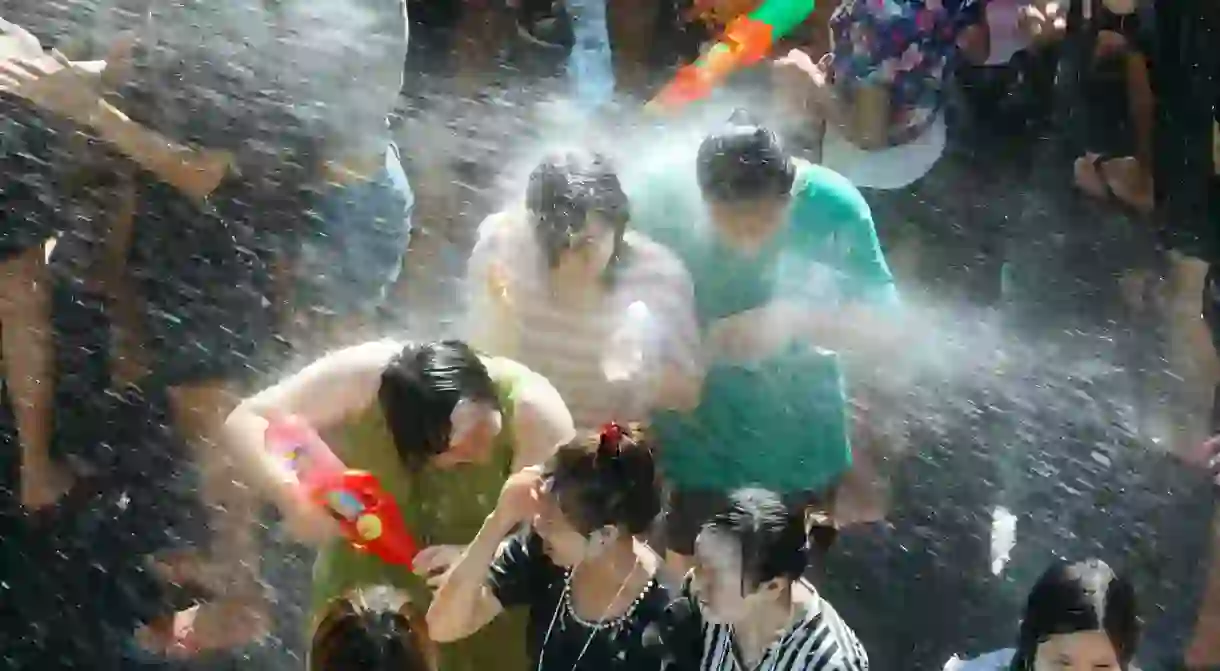Songkran: Thailand's Water Festival

Emily Eastman talks about her experiences of the Thai Water Festival and the traditional festivities of Songkran, which is celebrated every year from the 13th to the 15th of April. It is renowned throughout the world for its festive water celebration.
Did you know – Culture Trip now does bookable, small-group trips? Pick from authentic, immersive Epic Trips, compact and action-packed Mini Trips and sparkling, expansive Sailing Trips.
A common misconception is that Songkran, or Thai New Year, will involve a group of preschoolers brandishing a few water pistols at their carefully selected co-celebrators. Taking place in April, Songkran embraces everyone.




Songkran in Thai means to ‘move’ or ‘change place’. At some point in Thailand’s history, Songkran integrated with the Water Festival, which historically occurred on the day when the sun changes position in the zodiac. The Thai people believe that water is spiritually purifying: it cleanses you of any bad luck or grievances from the past year, and blesses you with fortune and happiness for the year ahead. The festival originated with locals collecting water that had been poured over Buddha statues for cleansing. This was then used to bless village elders and family members by trickling it over their shoulders. Since these somewhat genteel beginnings, Songkran has developed into a kingdom-wide water fight, occurring in April, which luckily happens to be Thailand’s hottest month. As with many historical and cultural festivals, the emphasis has shifted from the spiritual and religious to enjoyment and joviality.



Nonetheless, this is not to suggest that the religious undertones are gone entirely. Thai people will spend a portion of Songkran visiting Wats (Buddhist monasteries) to give alms and ask for forgiveness, before focusing on what they hope the coming year will bring. As with Western culture, Thai people make New Year’s resolutions and not only cleanse themselves, but cleanse their homes with a thorough housekeeping session.



The northern capital of Chiang Mai plays host to the biggest celebrations of Songkran, with some festivities reputedly spanning six days. It is also more common in the north of Thailand for people to collect sand, which is taken to their local monastery. This sand — symbolic of dirt carried on their feet for the past year — is used to replenish the monastery before being sculpted into piles and decorated with colorful, celebratory flags.



The Khao San Road is the undisputed hub of activity for Bangkok’s modern celebration of Songkran. Cordoned off to traffic, the atmosphere in the backpacker district is electric. Thai and Farang (foreigners) alike hold posts equipped with cannon-sized water guns, pressure hoses and gigantic cooler boxes, with suitably strong men manning the buckets beside them.


It is impossible to leave your hotel room without encountering the mayhem, and you will soon find any resistance dwindling. Children, adults and the elderly dance together on the pavements; truckloads of teenagers, pumping heavy bass, maraud the streets; and the ever present street dogs take refuge wherever they can.


The thoroughfares are lined with stalls selling water guns of all shapes and sizes, as well as mixing buckets of clay. Children especially take delight in approaching Farang (foreigners) with a Wai and an apologetic smile as they wipe the clay on either cheek and utter ‘sa-wat-dee pi mai‘, or ‘Happy New Year’. This practice mirrors the act of Monks blessing objects. While the monks usually use chalk, the children seem to prefer clay which creates a far more satisfying mess.

It is illustrative of Thai culture that no one — apart from Monks, Nuns and the elderly — is exempt from Songkran’s buoyant festivities. While walking in Lumpini Park, we were approached by a group of four policemen, intent on smearing us with clay before taking a commemorative photo.

Being in Thailand for the New Year, we witnessed a country overcome by a contagious atmosphere of positivity and optimism. In spite of being drenched for three days running, and having clothes and sightseeing plans ruined, it was impossible to be annoyed: Songkran demonstrates Thailand’s ever-affirmative outlook on life.













